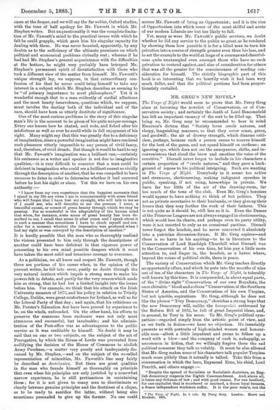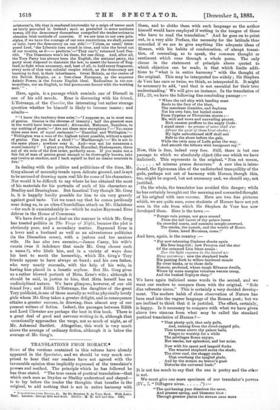MR. GREG'S NEW NOVEL.* The Verge of Night would seem
to prove that Mr. Percy Greg aims at becoming the novelist of Conservatism, or of Con- servative society ; and certainly the death of Lord Beaconsfield has left an important vacancy of the sort to be filled up. That being so, Mr. Greg may be recommended to bear in mind Emerson's dictum that "Society loves creole natures, and sleepy, languishing manners, so that they cover sense, grace, and goodwill ; the air of drowsy strength, which disarms criti- cism, perhaps, because such a person seems to reserve himself for the best of the game, and not spend himself on surfaces ; an ignoring eye, which does not see the annoyances, shifts, and in- conveniences that cloud the brow and smother the voice of the sensitive." Disraeli never forgot to include in his characters a certain proportion of "creole natures," and they gave a back- ground of repose to his political intriguing. Such are wanting in The Verge of Night. Everybody in it seems too active and strenuous, electioneering, making indignant speeches in public, speaking, if not using, horsewhips in private. We have far too little of the air of the drawing-room, far too much of the tone of the club. Even Mr. Greg's heroines would appear to have nothing to think of but politics. They act as private secretaries to their husbands, or they give up their lovers that they may farther the work of their fathers. This is not quite as it should be, still less as it is. Even the Dames of the Primrose Leagues are not always engaged in electioneering, which would lose its charm, and perhaps even its party utility, were it not resorted to only as an occasional pastime. Disraeli never forgot the boudoir, and he never converted it absolutely into a patrician discussion-forum. If Mr. Greg aspires—and there is no harm in his aspiring—to be in literature to the Conservatism of Lord Randolph Churchill what Disraeli was to the Conservatism of his own time, let him pay a little more attention to, and linger in, the boudoir, as a haven where, beyond the voices of political strife, there is peace.
The variety of Conservatism which Mr. Greg teaches directly as opportunity offers, and which he puts into the mouths of nine out of ten of the characters in The Verge of Night, is tolerably well known by this time. It is compounded, in about equal parts, of the "divine right" Conservatism of our own Royalists, the once chivalric" blood and culture" Conservatism of the Southern States of America, and the Conservatism of his own Utopian, but not ignoble, aspirations. Mr. Greg, although he does not like the phrase " Tory Democracy," cherishes a strong hope that the new Democracy will, unlike the bourgeoisie enthroned by the Reform Bill of 1832, be full of great Imperial ideas, and, in general, be Tory in his sense. To Mr. Greg's political syra- pat hies—regarded simply from the artistic point of view, and as set forth in fiction—we have no objection. He invariably presents us with portraits of high-minded women and honour- able men—albeit a little impatient and prone to follow up a. word with a blow—and the company of such is, unhappily, so uncommon in fiction, that we willingly forgive them the sad political nonsense they talk so volubly. It must be also allowed that Mr. Greg makes some of his characters talk popular Toryism much more pithily than it actually is talked. Take this from a conversation in which the hero, Raymond Erne, his chief, Lord Penritb, and others engage :—
" Despite the spread of Socialism or Socialistic doctrines, an Eng- lish democracy respects the Eighth Commandment. And, above all, it hates any defiance of law ; and with good reason. For one landlord, for one capitalist that is murdered or maimed, a dozen loyal tenants, a dozen independent workmen suffer. It is the poor man's, not the • The Verge of Night. In 3 vols. By Percy Greg. London: Hurst and. Blacked. 1885.
aristocrat's, life that is rendered intolerable by a reign of terror such as lately prevailed in Ireland ; such as prevailed in some northern towns, till the democracy themselves compelled the trades-unions to abandon Irish methods of coercion. If we are true to our own prin- ciples, if we have the courage of our own convictions, we shall, sooner or later, have the democracy on our side.'—' Unless, as usual,' inter- posed Leaf, 'the Liberals turn round in time, and take the bread out of our mouths, as 5— predicts.'—' They can't,' returned Lord Pen- rith. The Dissenters won't let them, for one thing. And, after all, the Tory Party has always been the English, the national party, the party most disposed to maintain the law, to assert the honour of Eng- land, to fight when necessary, and, best of all, to hold every fragment, every acre of that vast colonial empire which, as the democracy are learning to feel, is their inheritance. Great Britain, as the centre of the British Empire, as a first-class European, as the supreme Asiatic Power, is the future English ideal. Radicalism is too cos- mopolitan, too un-English, to find permanent favour with the working men.'" •
Here, again, is a passage which reminds one of Disraeli in one of his odd moods. Erne is discussing with his friend, L'Estrange, of the Courier, the interesting but rather strange question whether he himself is likely to become insane ; and admits- " know the tendency does exist.'—` I suppose so, as in most men of genius. Genius is the obverse of insanity ; half the greatest men in the world have been unsound ; Alexander, Mahomet, Napoleon, to say nothing of poets.'—' Are not these rare exceptions ?'—' No; name three sane men of equal eminence.'—' Hannibal and Wellington.'— 'Wellington was a man of the highest talent possible, without a spark of genius. Can you find a third P'—'Marlborough.'—` He is not in the same plane ; nowhere near it. And—was not his meanness a moral insanity ? I grant you Pericles, Hannibal, Shakespeare, three out of six men of the first order, perfectly sane. If you make out a fair list of men of genius great enough to be thoroughly known, take any twelve at random, and I back myself to find an insane neurosis in five.'"
In dealing with the politics and politicians of the time, Mr. Greg almost of necessity treads upon delicate ground, and is apt to be accused of drawing upon real life for some of his characters. Nor would it be difficult to say where he has obtained the most of his materials for his portraits of such of his characters as Bradley and Brasinghatn. But fanatical Tory though Mr. Greg is, it is happily hardly possible for him to sin very gravely against good taste. Yet we must say that he comes perilously near doing so, in an nitra-Chnrchillian attack on Mr. Gladstone —for such it unmistakeably is—which he makes Raymond Erne deliver in the House of Commons.
We have dwelt a good deal on the manner in which Mr. Greg
has treated politics in The Verge of Night, because the plot is obviously poor, and a secondary matter. Raymond Erne is
a lover and a husband as well as an adventurous politician (in the Disraelian sense), with a jealous and too anxious wife. He has also two enemies,—James Carey, his wife's cousin (was it indolence that made Mr. Greg choose such a name ?), who libels him, and in a variety of ways does his best to merit the horsewhip, which Mr. Greg's Tory friends appear to have always at +and ; and his own father, who very nearly succeeds, with the help of his wife, in having him placed in a lunatic asylum. But Mr. Greg gives us a rather blurred portrait of Meta, Erne's wife ; although it should be said, in justice to him, that Meta herself has an undisciplined nature. We have glimpses, however, of our old friend Ivy ; and Edith L'Estrange, the daughter of the great Tory publicist, is one of those morally as well as physically lovely girls whom Mr. Greg takes a greater delight, and in consequence attains a greater success, in drawing, than almost any of our present writers of fiction. Indeed, the passages between Edith and Lord Illswater are perhaps the best in this book. There is a great deal of good and nervous writing in it, although that occasionally approaches the verge, not so much of night, as of Mr. Ashmead Bartlett. Altogether, this work is very much above the average of ordinary fiction, although it is below the average of Mr. Greg's.







































 Previous page
Previous page